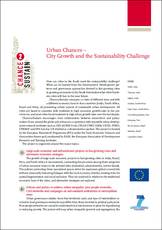Research AreasThe Chance2Sustain project has identified five issues around which the research is organised: |
|
|
Large-scale economic and infrastructure projects in fast-growing cities and alternative economic strategies: Led by Loraine Kennedy at the French National Center for Scientific Research (CNRS)
The growth of large-scale economic projects in fast-growing cities in India, Brazil, Peru, and South Africa is documented, contrasting the processes among three categories of urban economic bases in the selected cities (industrial, administrative, service-based). The policies promoting these specialised spaces strive for maximum global connectivity without necessarily favouring linkages with the local economy, thereby creating risks for spatial fragmentation and social exclusion. They are analysed in relation to the traditional economic base of the cities, and alternative strategies are explored.
Policies and politics to address urban inequality: poor people networks, CSO networks and campaigns on sub-standard settlements in metropolitan areas: Led by Einar Braathen at the Norwegian Institute for Urban and Regional Research (NIBR)
Urban governance studies show that territorial scale, and type of stakeholders involved in local governance networks may differ from those involved in political party work. Poor people networks are crucial to understand local mechanisms in place for reproducing or reducing poverty. The project will map urban inequality (poverty and segregation), the urban political-administrative system, and campaigns for social inclusion and environmental upgrading of sub-standard settlements. Taking the various country contexts into account, the project will analyse how the interaction between the various types of social and political actors – poor people networks, CSO networks, government – can promote social / environmental aspects of sustainable development. Environmental risk assessment and inclusive scenario building for reducing costs: reconciling the green and brown agenda: Led by Liliana Miranda Sara at the Cities for Life Forum (FORO)
Urban environmental issues are often portrayed in terms of two distinct agendas. Research on the ‘unfinished’ or ‘brown’ agenda encompasses the conventional environmental health issues. Research on the ‘green’ agenda focuses on the other environmental dimensions of urban sustainable development, nowadays often with a focus on its potential impact on climate change. This research will map out complementarities and conflict arising from integrating the green and the brown agenda across fast-growing cities, with a focus on water and related energy issues. In scenario-building exercises with relevant local stakeholders in the relevant cities the predicted consequences of climate change will be taken up. |
Developing participatory ‘spatial’ knowledge models in metropolitan governance networks for sustainable development and an integrated model of urban sustainable development: Led by Isa Baud at the Amsterdam Institute for Metropolitan and International Development Studies (AMIDSt (UvA)) and Catherine Oelofse with Dianne Scott at the University of KwaZulu-Natal (UKZN)
Utilizing spatially disaggregated community knowledge to address needs in a more integrated fashion is still rare and contested by governments. This approach is being developed within the research program on urban poverty currently undertaken by the GID (AISSR-UvA) with SPA in several Indian cities. This model will be used in the 10 participating cities to analyze the factors contributing to (or preventing) sustainable development, and integrate the issues included in this research project: economic analysis, the poverty / inequality analysis, the environmental risk assessment issues, and the funding patterns and exigencies analyzed in this project. Combining fiscal decentralization, participatory budgeting, and inclusive development: supporting sustainable development policies, monitoring and implementation: Led by Prof. Dr. N.Sridharan, School of Planning and Architecture, New Delhi (SPA)
The main concern is to find out to what extent fiscal decentralization has opened up opportunities for including local knowledge and spatial information in participatory budgeting processes, what local political and institutional factors influence them, what aspects of sustainable development are incorporated, and what trade-offs are made. About the project:
The 21st century is the century of the city. Currently, the global urban population is expected to double within one generation.
This growth will be concentrated in cities in developing countries, as nine out of ten new urban residents will be born in cities in the South.
Chance2Sustain flyer in English
|

